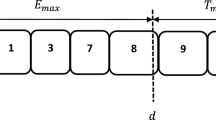Abstract
We introduce a natural but seemingly yet unstudied variant of the problem of scheduling jobs on a single machine so as to minimize the number of tardy jobs. The novelty of our new variant lies in simultaneously considering several instances of the problem at once. In particular, we have n clients over a period of m days, where each client has a single job with its own processing time and deadline per day. Our goal is to provide a schedule for each of the m days, so that each client is guaranteed to have their job meet its deadline in at least \(k \le m\) days. This corresponds to an equitable schedule where each client is guaranteed a minimal level of service throughout the period of m days. We provide a thorough analysis of the computational complexity of three main variants of this problem, identifying both efficient algorithms and worst-case intractability results.
Similar content being viewed by others
Data availability
No data, material, or code is used in this work.
Notes
In 2018, ACM started its new conference series on “Fairness, Accountability, and Transparency (originally FAT, since 2021 FAccT).”
References
Adamu, M., & Adewumi, A. (2014). Survey of single machine scheduling to minimize weighted number of tardy jobs. Journal of Industrial and Management Optimization, 10, 219.
Bagchi, U., Sullivan, R., & Chang, Y. (1987). Minimizing mean squared deviation of completion times about a common due date. Management Science, 33(7), 894–906.
Bansal, N., Kimbrel, T., & Sviridenko, M. (2006). Job shop scheduling with unit processing times. Mathematics of Operations Research, 31(2), 381–389.
Baptiste, P. (1999). Polynomial time algorithms for minimizing the weighted number of late jobs on a single machine with equal processing times. Journal of Scheduling, 2(6), 245–252.
Baptiste, P. (2000). Scheduling equal-length jobs on identical parallel machines. Discrete Applied Mathematics, 103, 21–32.
Baptiste, P., Brucker, P., Knust, S., & Timkovsky, V. G. (2004). Ten notes on equal-processing-time scheduling. Quarterly Journal of the Belgian, French and Italian Operations Research Societies, 2(2), 111–127.
Baruah, S. K., Cohen, N. K., Plaxton, C. G., & Varvel, D. A. (1996). Proportionate progress: A notion of fairness in resource allocation. Algorithmica, 15(6), 600–625.
Bentert, M., Bredereck, R., Györgyi, P., Kaczmarczyk, A., & Niedermeier, R. (2021). A multivariate complexity analysis of the material consumption problem. In Proceedings of the 35th AAAI conference on artificial intelligence, AAAI 2021 (pp. 11755–11763). AAAI Press.
Bentert, M., van Bevern, R., & Niedermeier, R. (2019). Inductive \(k\)-independent graphs and \(c\)-colorable subgraphs in scheduling: A review. Journal of Scheduling, 22(1), 3–20.
Bertsimas, D., Farias, V. F., & Trichakis, N. (2011). The price of fairness. Operations Research, 59(1), 17–31.
Bredereck, R., Kaczmarczyk, A., Niedermeier, R. (2018). Envy-free allocations respecting social networks. In Proceedings of the 17th international conference on autonomous agents and multiagent systems, AAMAS 2018 (pp. 283–291).
Brucker, P., Hurink, J., & Knust, S. (2002). A polynomial algorithm for \(p|p_j=1, r_j,\text{ outtree }|\sum c_j\) problem. Mathematical Methods of Operations Research, 56, 407–412.
Bülbül, K., Kedad-Sidhoum, S., & Şen, H. (2019). Single-machine common due date total earliness/tardiness scheduling with machine unavailability. Journal of Scheduling,22, 543–565.
Chen, C., & Bulfin, R. (1990). Scheduling unit processing time jobs on a single machine with multiple criteria. Computers & Operations Research, 17(1), 1–7.
Chetto, H., Silly, M., & Bouchentouf, T. (1990). Dynamic scheduling of real-time tasks under precedence constraints. Real-Time Systems, 2(3), 181–194.
Correa, J. R., & Schulz, A. S. (2005). Single-machine scheduling with precedence constraints. Mathematics of Operations Research, 30(4), 1005–1021.
Cygan, M., Fomin, F. V., Kowalik, Ł, Lokshtanov, D., Marx, D., Pilipczuk, M., et al. (2015). Parameterized algorithms. Springer.
de Weerdt, M., Baart, R., & He, L. (2021). Single-machine scheduling with release times, deadlines, setup times, and rejection. European Journal of Operational Research, 291(2), 629–639.
Dehghan, A., Sadeghi, M., & Ahadi, A. (2015). On the complexity of deciding whether the regular number is at most two. Graphs and Combinatorics, 31(5), 1359–1365.
Dorndorf, U., Pesch, E., & Phan-Huy, T. (2000). A time-oriented branch-and-bound algorithm for resource-constrained project scheduling with generalised precedence constraints. Management Science, 46(10), 1365–1384.
Downey, R. G., & Fellows, M. R. (2013). Fundamentals of parameterized complexity. Springer.
Fellows, M. R., & McCartin, C. (2003). On the parametric complexity of schedules to minimize tardy tasks. Theoretical Computer Science, 298(2), 317–324.
Flum, J., & Grohe, M. (2006). Parameterized complexity theory, volume XIV of texts in theoretical computer science. An EATCS series. Springer.
Fluschnik, T., Skowron, P., Triphaus, M., & Wilker, K. (2019). Fair knapsack. In Proceedings of the 33rd AAAI conference on artificial intelligence, AAAI 2019 (pp. 1941–1948). AAAI Press.
Ganian, R., Hamm, T., & Mescoff, G. (2020). The complexity landscape of resource-constrained scheduling. In Proceedings of the 29th international joint conference on artificial intelligence, IJCAI 2020 (pp. 1741–1747). ijcai.org
Garey, M. R., & Johnson, D. S. (1979). Computers and intractability: A guide to the theory of NP-completeness. W. H: Freeman.
Garey, M. R., Johnson, D. S., & Stockmeyer, L. (1976). Some simplified NP-complete problems. Theoretical Computer Science, 1(3), 237–267.
Graham, R., Lawler, E., Lenstra, J., & Kan, A. (1979). Optimization and approximation in deterministic sequencing and scheduling: A survey. Annals of Discrete Mathematics, 3, 287–326.
Gupta, S., Jalan, A., Ranade, G., Yang, H., & Zhuang, S. (2020). Too many fairness metrics: Is there a solution? SSRN. https://dx.doi.org/10.2139/ssrn.3554829
Hall, P. (1935). On representatives of subsets. Journal of the London Mathematical Society, 10, 26–30.
Heeger, K., Hermelin, D., Mertzios, G. B., Molter, H., Niedermeier, R., & Shabtay, D. (2021). Equitable scheduling on a single machine. In Proceedings of the 35th AAAI conference on artificial intelligence, AAAI ’21 (pp. 11818–11825). AAAI Press.
Hermelin, D., Manoussakis, G., Pinedo, M., Shabtay, D., & Yedidsion, L. (2020). Parameterized multi-scenario single-machine scheduling problems. Algorithmica, 82(9), 2644–2667.
Hermelin, D., Molter, H., Niedermeier, R., & Shabtay, D. (2021). Equitable scheduling for the total completion time objective. arXiv:2112.13824
Hermelin, D., Pinedo, M., Shabtay, D., & Talmon, N. (2019). On the parameterized tractability of single machine scheduling with rejection. European Journal of Operational Research, 273(1), 67–73.
Hermelin, D., Shabtay, D., & Talmon, N. (2019). On the parameterized tractability of the just-in-time flow-shop scheduling problem. Journal of Scheduling, 22(6), 663–676.
Hoitomt, D. J., Luh, P. B., Max, E., & Pattipati, K. R. (1990). Scheduling jobs with simple precedence constraints on parallel machines. IEEE Control Systems Magazine, 10(2), 34–40.
Hopcroft, J. E., & Karp, R. M. (1973). An \(n^{5/2}\) algorithm for maximum matchings in bipartite graphs. SIAM Journal on Computing, 2(4), 225–231.
Jansen, K., Kratsch, S., Marx, D., & Schlotter, I. (2013). Bin packing with fixed number of bins revisited. Journal of Computer and System Sciences, 79(1), 39–49.
Johnson, D. S. (1974). Fast algorithms for bin packing. Journal of Computer and System Sciences, 8(3), 272–314.
Johnson, D. S., Demers, A. J., Ullman, J. D., Garey, M. R., & Graham, R. L. (1974). Worst-case performance bounds for simple one-dimensional packing algorithms. SIAM Journal on Computing, 3(4), 299–325.
Karp, R. M. (1972). Reducibility among combinatorial problems. In Complexity of computer computations (pp. 85–103). Springer.
Kumar, A., & Kleinberg, J. M. (2006). Fairness measures for resource allocation. SIAM Journal on Computing, 36(3), 657–680.
Lang, J., & Rothe, J. (2016). Fair division of indivisible goods. In J. Rothe (Ed.), Economics and computation, An introduction to algorithmic game theory, computational social choice, and fair division, Springer texts in business and economics (pp. 493–550). Springer.
Lauff, V., & Werner, F. (2004). Scheduling with common due date, earliness and tardiness penalties for multimachine problems: A survey. Mathematical and Computer Modelling, 40(5), 637–655.
Lenstra, H. W., Jr. (1983). Integer programming with a fixed number of variables. Mathematics of Operations Research, 8(4), 538–548.
Lenstra, J., & Rinnooy-Kan, A. (1980). Complexity results for scheduling chains on a single machine. European Journal of Operational Research, 4(4), 270–275.
Lenstra, J. K., & Rinnooy-Kan, A. (1978). Complexity of scheduling under precedence constraints. Operations Research,26(1), 22–35.
Maxwell, W. L. (1970). On sequencing \(n\) jobs on one machine to minimize the number of late jobs. Management Science, 19(1), 295–297.
Mnich, M., & van Bevern, R. (2018). Parameterized complexity of machine scheduling: 15 open problems. Computers & Operations Research, 100, 254–261.
Mnich, M., & Wiese, A. (2015). Scheduling and fixed-parameter tractability. Mathematical Programming, 154(1), 533–562.
Möhring, R. H., Skutella, M., & Stork, F. (2004). Scheduling with and/or precedence constraints. SIAM Journal on Computing, 33(2), 393–415.
Moore, J. (1968). An \(n\) job, one machine sequencing algorithm for minimizing the number of late jobs. Management Science, 15(2), 102–109.
Mosheiov, G., & Pruwer, S. (2021). On the minmax common-due-date problem: Extensions to position-dependent processing times, job rejection, learning effect, uniform machines and flowshops. Engineering Optimization, 53(3), 408–424.
Mosheiov, G., & Yovel, U. (2006). Minimizing weighted earliness-tardiness and due-date cost with unit processing-time jobs. European Journal of Operational Research, 172(2), 528–544.
Niedermeier, R. (2006). Invitation to fixed-parameter algorithms. Oxford University Press.
Panwalkar, S. S., Smith, M. L., & Seidmann, A. (1982). Common due date assignment to minimize total penalty for the one machine scheduling problem. Operations Research, 30(2), 391–399.
Shabtay, D., Arviv, K., Edan, Y., & Stern, H. (2014). A combined robot selection and scheduling problem for flow-shops with no-wait restrictions. Omega, 43, 96–107.
Sturm, L. B. J. M. (1970). A simple optimality proof of Moore’s sequencing algorithm. Management Science, 17(1), 116–118.
T’kindt, V., Shang, L., & Croce, F. D. (2020). Exponential time algorithms for just-in-time scheduling problems with common due date and symmetric weights. Journal of Combinatorial Optimization,39, 764–775.
van Bevern, R., Bredereck, R., Bulteau, L., Komusiewicz, C., Talmon, N., & Woeginger, G. J. (2016). Precedence-constrained scheduling problems parameterized by partial order width. In International conference on discrete optimization and operations research, DOOR 2016 (pp. 105–120). Springer.
van Bevern, R., Niedermeier, R., & Suchỳ, O. (2017). A parameterized complexity view on non-preemptively scheduling interval-constrained jobs: Few machines, small looseness, and small slack. Journal of Scheduling, 20(3), 255–265.
Walsh, T. (2020). Fair division: The computer scientist’s perspective. In Proceedings of the 29th international joint conference on artificial intelligence, IJCAI 2020 (pp. 4966–4972). ijcai.org
Wang, T., & Bellenguez-Morineau, O. (2019). The complexity of parallel machine scheduling of unit-processing-time jobs under level-order precedence constraints. Journal of Scheduling, 22, 263–269.
Author information
Authors and Affiliations
Corresponding author
Ethics declarations
Conflict of interest
The authors do not have conflicts of interest to declare.
Additional information
Publisher's Note
Springer Nature remains neutral with regard to jurisdictional claims in published maps and institutional affiliations.
An extended abstract of this paper appeared in the proceedings of the 35th AAAI Conference on Artificial Intelligence (AAAI’21) (Heeger et al., 2021). This version contains full proof details and additional hardness results.
Klaus Heeger was supported by DFG Research Training Group 2434 “Facets of Complexity.” George B. Mertzios was supported by the EPSRC grant EP/P020372/1 and by DFG RTG 2434 while visiting TU Berlin. Hendrik Molter was supported by the German Research Foundation (DFG), project MATE (NI 369/17) and by the Israeli Science Foundation (ISF), grant No. 1070/20. Main work was done while Hendrik Molter was affiliated with TU Berlin.
Rights and permissions
Springer Nature or its licensor holds exclusive rights to this article under a publishing agreement with the author(s) or other rightsholder(s); author self-archiving of the accepted manuscript version of this article is solely governed by the terms of such publishing agreement and applicable law.
About this article
Cite this article
Heeger, K., Hermelin, D., Mertzios, G.B. et al. Equitable scheduling on a single machine. J Sched 26, 209–225 (2023). https://doi.org/10.1007/s10951-022-00754-6
Accepted:
Published:
Issue Date:
DOI: https://doi.org/10.1007/s10951-022-00754-6




